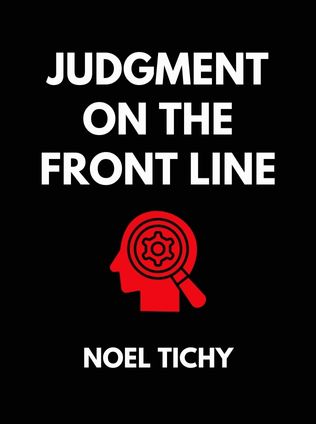
Judgment on the Front Line
How Smart Companies Win By Trusting Their People
By Noel Tichy,
Published 10/2012
About the Author
Chris DeRose has an extensive background in consulting and education, having worked globally to help organizations improve their leadership and strategic alignment. His experience includes executive education at the Ross School of Business at the University of Michigan. DeRose's insights are rooted in years of partnering with CEOs and senior leaders to transform their companies by leveraging the untapped potential of their frontline employees.
Noel M. Tichy, a renowned author and professor at the Ross School of Business, is celebrated for his best-selling business books, including "Judgment" and "Control Your Destiny or Someone Else Will." Tichy brings a wealth of knowledge from his academic and practical experiences, providing deep insights into organizational leadership and change management.
Main Idea
The central thesis of Judgment on the Front Line: How Smart Companies Win by Trusting Their People is that frontline employees are crucial to the success of any organization. DeRose and Tichy argue that these employees, who interact directly with customers and face day-to-day challenges, hold invaluable knowledge and creative potential that often goes untapped. The book proposes a five-step process for building a frontline-focused organization, enabling companies to harness this potential and drive innovation from the bottom up.
Table of Contents
- Preface
- The Frontline Innovation Factory
- People: The Most Ignored Asset
- The Organizational Paradox: Control Versus Creativity
- Building the Front Line-Focused Organization
- Starting at the Top
- Teaching People to Think
- Experiment to Innovate on the Front Line
- Breaking Down the Hierarchy
- Investing in Frontline Capability
- A Never-Ending Process
- Corporate Citizenship on the Front Line
- Conclusion
Preface
In the United States, at least one-fifth of the entire workforce might be classified as frontline employees. Retail and service workers alone total more than fifteen million people. These associates are experienced in the ways of customers, square off against the competition each day, and have insights into where the machinery of their organization consistently breaks down. Yet most organizations do little to learn from these wise workers or expand their ability to deal with the complexities they face.
"We don't see many company leaders who tap into more than a tiny fraction of the knowledge, creativity, and judgment of their largest group of employees." - Chris DeRose and Noel M. Tichy
The Frontline Innovation Factory
Greg Linden's story at Amazon exemplifies how frontline innovation can drive company success. Linden noticed that impulse buys were common in supermarkets and suggested a similar feature for Amazon's online checkout process. Despite resistance from a senior vice president, the idea was tested and proved highly profitable.
"Measurement was good. The test rolled out." - Greg Linden
This example highlights the importance of a culture that supports experimentation and values input from all levels of the organization. Amazon's success with Linden's idea underscores the potential for significant innovation driven by frontline employees.
People: The Most Ignored Asset
The mantra "people are our most important asset" is commonplace today in business circles, yet few companies truly leverage the insights of their frontline employees. These workers interact directly with customers and understand their needs and frustrations better than anyone else. By ignoring this valuable resource, companies miss out on opportunities for improvement and innovation.
Organizations must shift their focus to actively involve frontline employees in decision-making processes. This requires not just listening to their ideas but also creating systems that empower them to take action and implement changes.
Sign up for FREE and get access to 1,400+ books summaries.
You May Also Like
The Subtle Art of Not Giving a F*ck
A Counterintuitive Approach to Living a Good Life
By Mark MansonRich Dad Poor Dad
What the Rich Teach Their Kids About Money - That the Poor and Middle Class Do Not!
By Robert T. KiyosakiHow To Win Friends and Influence People
The All-Time Classic Manual Of People Skills
By Dale CarnegieQuiet: The Power of Introverts
The Power of Introverts in a World That Can't Stop Talking
By Susan Cain



















